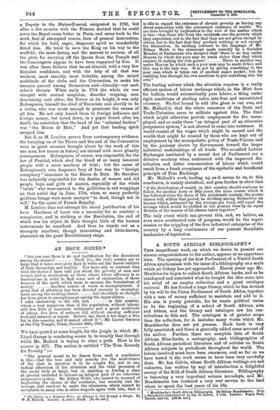AN ISSUE JOINED.*
"Are you sure there is no real justification for the discontent among the masses ? Their [i.e., the rich] estates are so large that it takes over sixty days to write out the barest outlines of their dimensions and locality. You have only to contrast that with the stories I have told you about the poverty of men and women just as meritorious as those others whose affluence is so burdensome in order to find some sort of explanation of those tremors of the earth which seem to menace the foundations of society Another source of waste is unemployment. A great deal of attention has been devoted recently to unemploy- ment among the working classes but absolutely no thought has been given to unemployment among the upper classes
I refer exclusively to the idle rich in this country, where a very numerous class of the population, without labour, still live lives of luxurious indulgence and a great multitude of others live lives of arduous toil without earning sufficient food and raiment or repose. Believe me, there is too large a free list in this country, and it cannot afford it."—Mr. LLOYD GEORGE at the City Temple, Times, October 18th, 1910.
WE have quoted at some length, for the jungle in which Mr.
Lloyd George is wandering seems to be exactly that through which Mr. Mallock is trying to clear a path. Here is his answer (p. 257). The section is entitled "The True Remedy for Poverty ":—
"The general moral to be drawn from such a conclusion is this—that the true and only remedy for the misfortunes of the class in question is to be sought for, not in any radical alteration of the structure and the vital processes of the social body at large, but in enabling or forcing a class at present excluded to become an integral part of an otherwise progressive system. Mr. Sidney Webb, who cannot be accused of neglecting the claims of the residuum, has recently had the courage and candour to make the admission, which cannot be acceptable to many who in other respects agree with him, that it • The Nation as a Business Firm an Attempt to Out through a Jungle. By W. II. Mallock. London : A. and C. Black. [3s. 6d. net.] is idle to regard the extremes of chronic poverty as having any direct connection with the concurrent existence of wealth. We are here brought by implication to the root of the matter which is this—that those who form the residnuin owe the poverty which they experience, not to the fact that they are not given enough by others, but to the fact that they produce nothing or not enough for themselves. In striking contrast to the language of Mr. Sidney Webb is the statement made recently by a Socialist Member of Parliament who declared that there is no way under Heaven by which the poor may be made richer than that which consists in making the rich poorer.' There is another way tinder Heaven by which such a poor man may be made richer, and this way is the only way. It is, not by giving something to the poor man which is taken out of another man's pocket; but by enabling him through his own exertions to put something into his own."
The healing solvent which the situation requires is a really efficient system of labour exchange which, as the Mint does for bullion, would automatically pass labour, a thing under right conditions of sterling value, into free and unrestricted currency. We feel bound to add (the gloss is our own, not Mr. Mallock's) that the whole resources of the State and Trade-Unionism seem to militate against this. The fund which might otherwise provide employment for the unem- ployed, and so make them "an integral part of an otherwise progressive system," is not allowed to come into existence. It would consist of the wages which might be earned and the wealth that might be created by those who are kept out of employment by the monopolistic policy of Trade-Unions, and by the jealousy shown by Government toward the larger industrial undertakings of all kinds. The so-called Labour Exchanges instituted by a recent Act of Parliament are a delusive mockery when contrasted with the improved dis- tribution and better remuneration of labour which would result from a frank acceptance of the equitable and beneficent principle of Free Exchange.
Mr. Mallock's work, leading up, as it seems to us, to this conclusion, is mainly statistical, and goes further to show that
"if the distribution of wealth in this country should continue to follow, for another forty or fifty years, the same course which it has followed since the dawn of the nineteenth century, the poorer classes will, within that period, be dividing among themselves an income which, estimated by the average per head, will equal the average which would be yielded at the present time by an equal division of the income of all classes taken together."
The only event which can prevent this, and, we believe, an even more accelerated rate of progress, would be the super- session or the crippling of the free industrial enterprise of the country by a long continuance of our present Socialistic tendencies of legislation.










































































 Previous page
Previous page